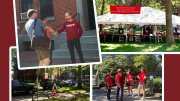On a sunny Tuesday morning in late August, President Alan M. Garber walked through Harvard Yard, stopping to chat with first-year students as they unpacked cars and carried boxes into dorms. The annual tradition—in which the sitting president welcomes new students during move-in—provides a sense of normalcy in what has been anything but a typical start to Harvard’s 2025-2026 academic year.
These first-years are beginning their college journey amid heightened political pressure on the University. At stake are hundreds of millions in federal research funding and the visa status of international students, many of whom were admitted but remain in limbo due to government travel restrictions. Garber’s presence in the Yard, as he quietly chatted and joked with students, carried more significance than usual. To many observers within and outside of Harvard, he has become not only the leader of the University, but also the de facto face of resistance to the sweeping political reforms affecting other institutions of higher education.
Garber, dressed in bright red and often holding his arms clasped behind his back, spoke with the gathered students about their home cities, their potential future Houses (and his own experiences in Dunster), and their preparation for the semester, which includes a new online pre-orientation course first-years take prior to arriving in Cambridge and on-campus programming to promote religious pluralism. Over the next few days, the rest of the first-year class will arrive, filling dorm rooms with plants, pillows, and fresh textbooks from the Coop. Upperclass students return starting on Thursday, August 28, and move-in will continue through the weekend.
Meanwhile, discussions between the University and the Trump administration are ongoing, following settlements inked by other universities earlier this summer. A proposed agreement reported by The New York Times could see Harvard invest up to $500 million in educational and vocational programs over several years in lieu of direct payments to the government. In return, federal research funding would be restored in part or in full, and restrictions on international student admissions would be lifted. Neither the White House nor Harvard leadership has officially signaled that a deal is forthcoming, and some alumni, faculty, and students have urged the University not to settle.
For students already on campus, the focus is on starting fresh: meeting roommates and adjusting to campus routines. Over the next three weeks, classes will begin, sports teams will start practicing, clubs will meet, and students—both new and returning—will adjust to yet another version of the “new normal.” Even amid national scrutiny, the rhythms of the nation’s oldest college continue.









